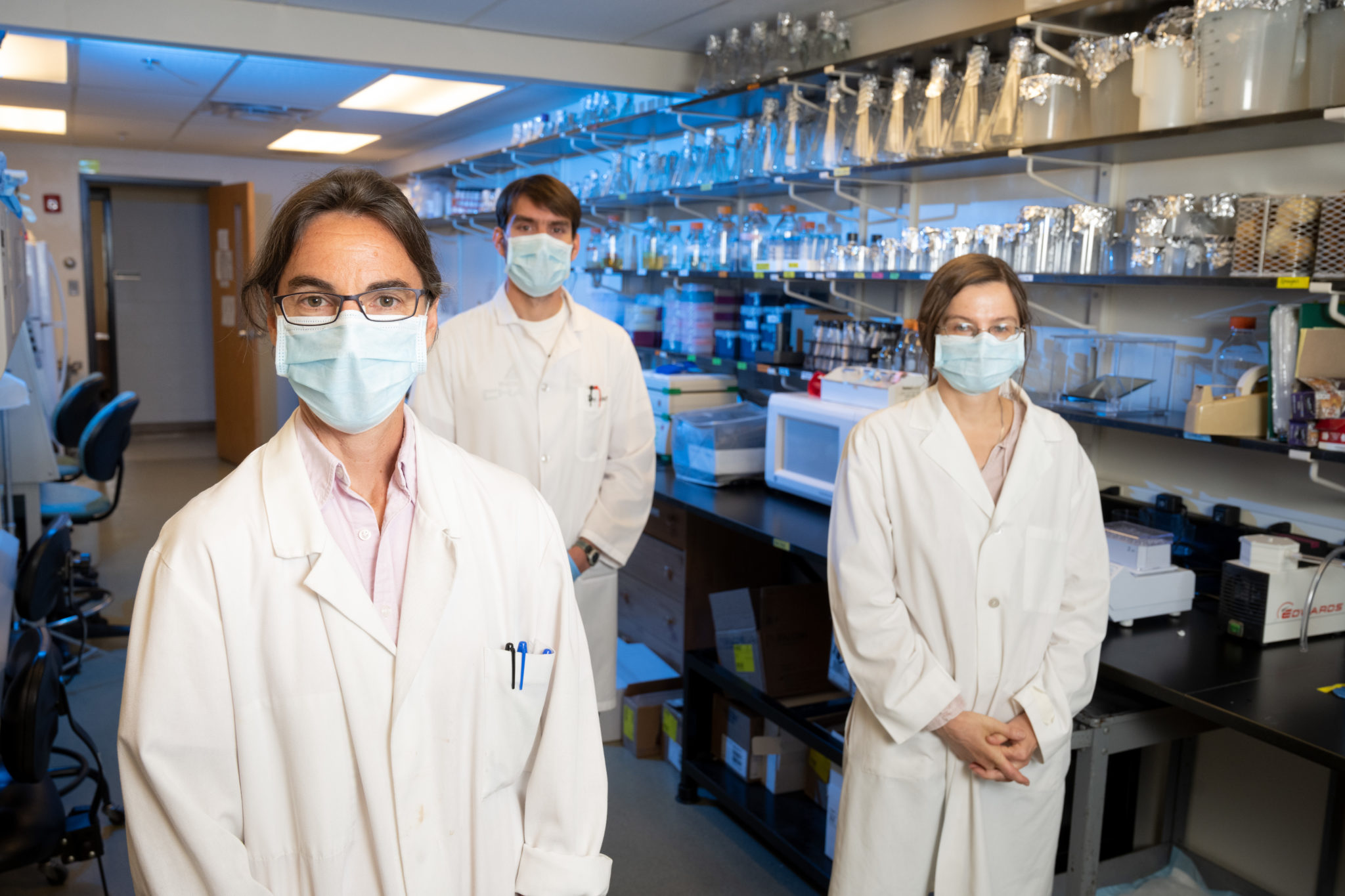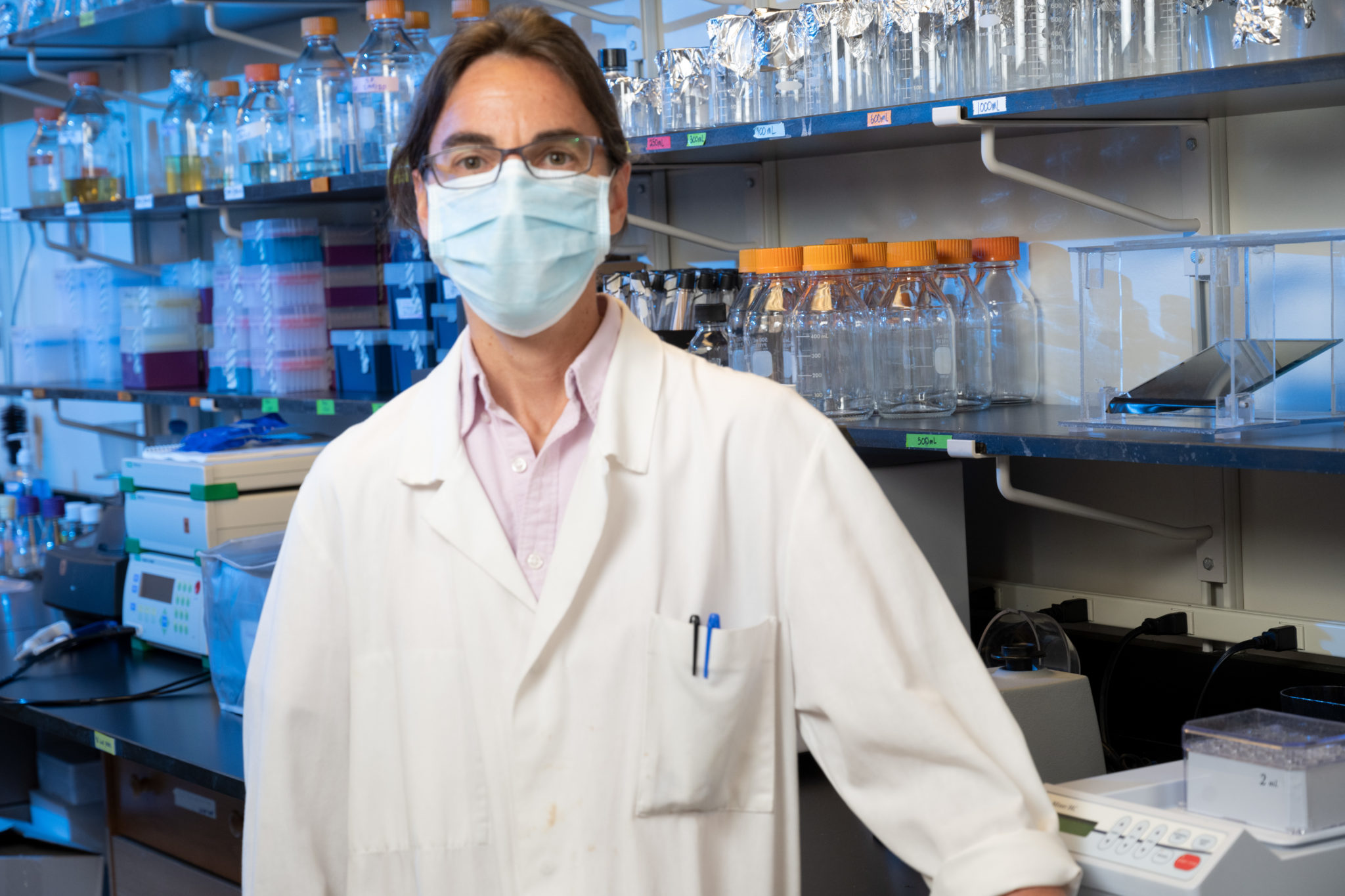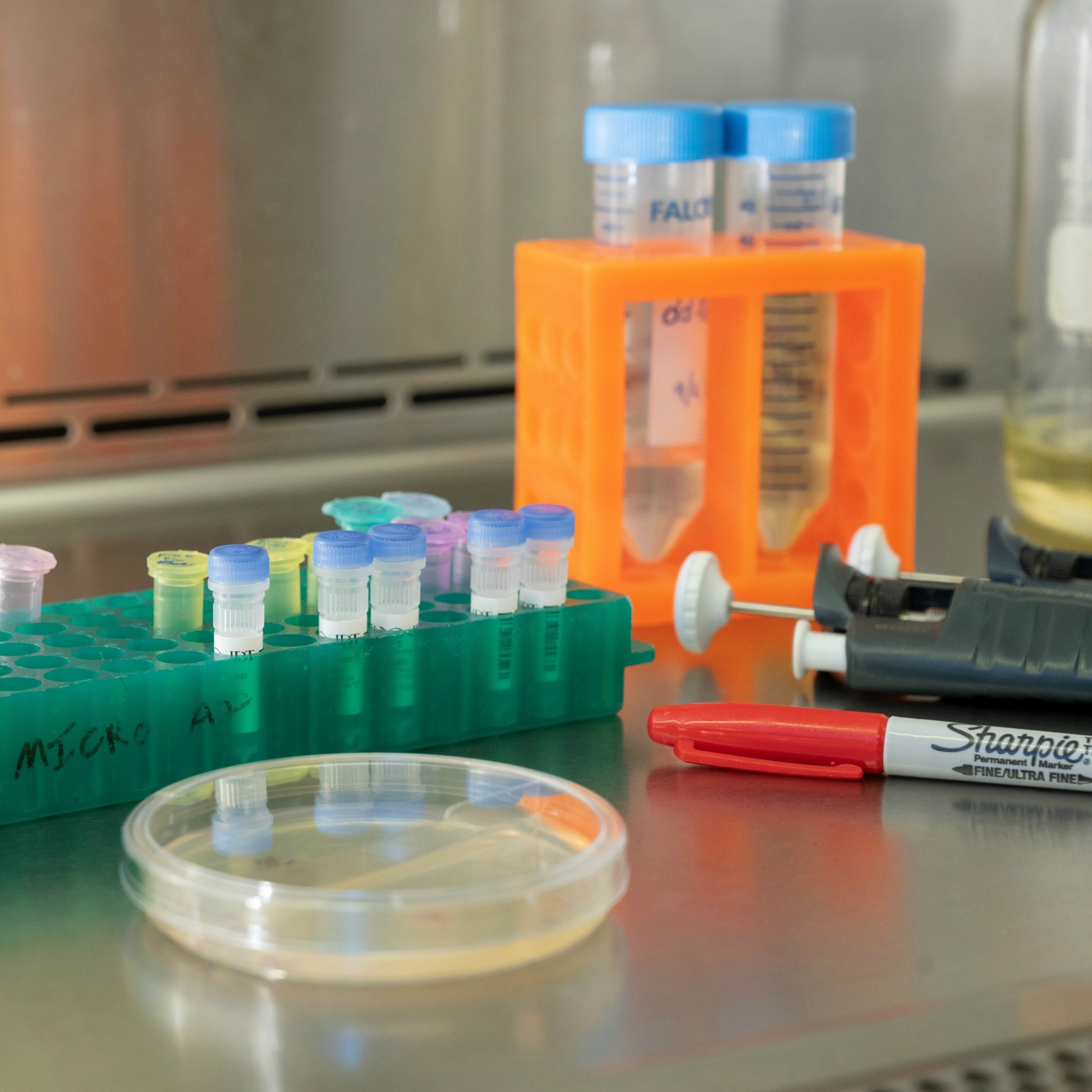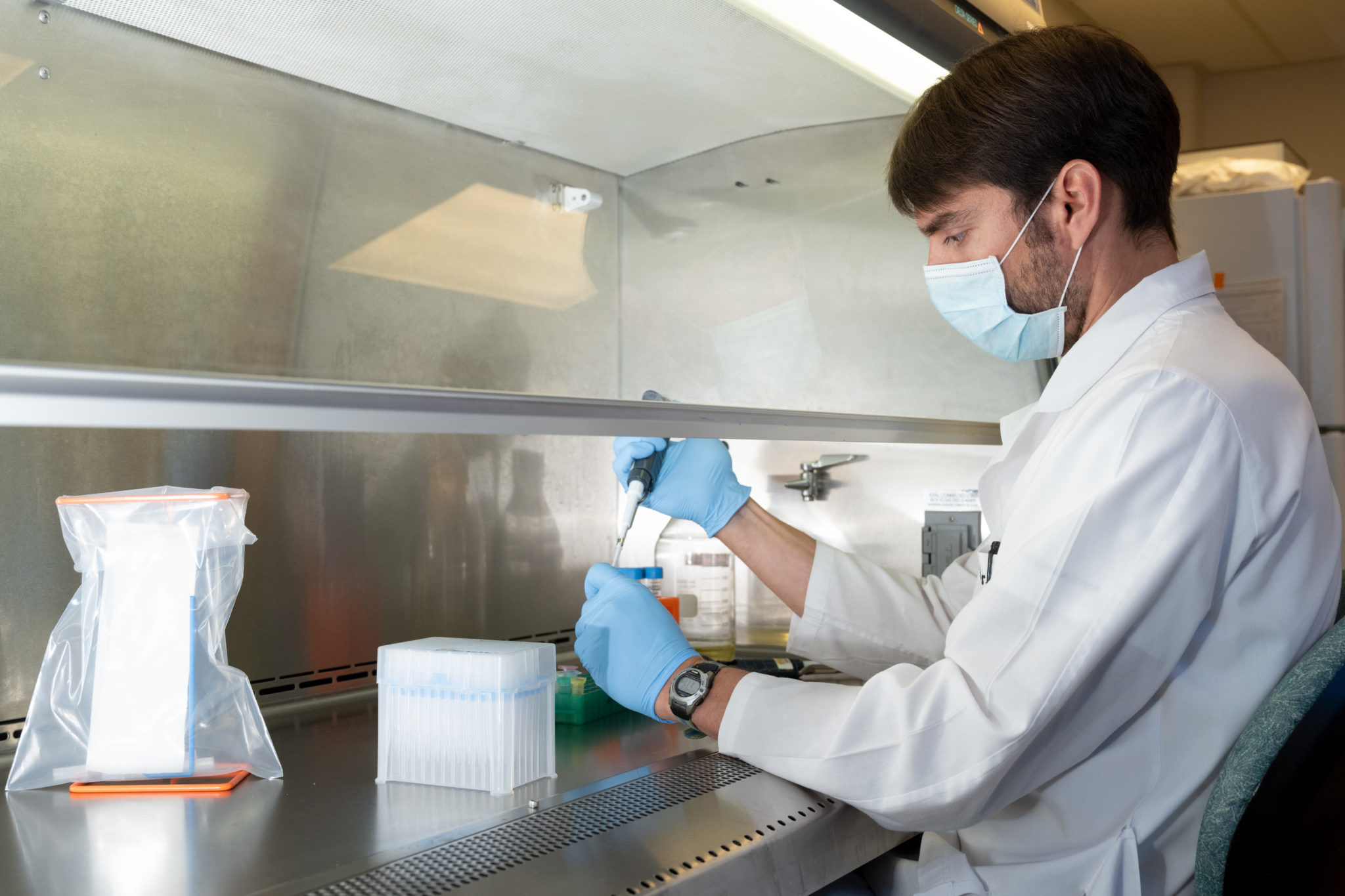
Professor Mary Jackson (left) in her lab at CSU with research scientists Juan Manuel Belardinelli and Anna Grzegorzewicz. Photo: John Eisele/CSU Photography
Mary Jackson, a professor in the Department of Microbiology, Immunology and Pathology at Colorado State University, has been studying tuberculosis for the last 25 years. Originally from France, she received a doctoral degree from the Pasteur Institute, where the vaccine to prevent tuberculosis was discovered in the early 1900s. The Bacillus Calmette-Guerin or BCG vaccine is the most widely used of all vaccines and reaches more than 80% of newborns and infants around the world, according to the World Health Organization.
Jackson recently spoke with SOURCE about a new research project she’s leading at Colorado State University to see if the BCG vaccine platform could be an effective way to fight COVID-19.
Q: How did you decide to pursue this new vaccine research?
Jackson: Scientists have recently noticed some potential intriguing associations. Countries that practice universal BCG vaccination seem to have fewer cases of COVID-19 and a lower mortality rate. It has in fact long been known that countries where children are vaccinated with BCG tend to see fewer deaths from pneumonia and sepsis in addition to tuberculosis. In general, it seems that the vaccine somehow prepares the immune system to better protect people of all ages from a broad range of diseases caused by bacteria, fungi or viruses.
At this point, there’s no proof of what the BCG vaccine might be able to do. But there are currently clinical trials in five different countries – Australia, Egypt, Germany, Netherlands and the United States – to see if BCG may protect health care workers and older people against COVID-19. We will know in a few months whether that’s true or not.
My team decided to take this potential benefit of BCG one step further by having it express antigens from the SARS-CoV-2 virus with the hope that it will stimulate an even greater and more specific immune response against COVID-19.
Q: How were the countries selected for the clinical trials with the existing BCG vaccine?
Jackson: Scientists and clinicians picked countries that either were already using the BCG vaccine or countries like the U.S. where it’s never been used. This could have an impact on the results. In the U.S., nobody has seen the vaccine, except for immigrants like me. That could provide much better terrain for research, if you have people getting the vaccine for the first time. Will they be more protected than others?
Q: What are some of the positive facets of the BCG vaccine that have potential promise to fight COVID-19?
Jackson: More than 5 billion doses of the vaccine have been administered since 1921 with very few side effects. This is not to say that the modified BCG expressing COVID-19 antigens will be just as safe, but it is a very good place to start. You can give BCG to children at birth or anytime after. It provides long-term immunity, approximately 10 years, and it contains live bacteria that have been weakened, or attenuated. The BCG vaccine is easy to produce; you can grow it in a fermenter and freeze-dry it; it can be transported easily. You don’t need a refrigerator or a cooler to store it.
There have been many scientific studies showing that the BCG vaccine improves a person’s immunity to Staphylococcus aureus, Candida albicans or Yellow Fever virus. Some other BCG-derived vaccine candidates designed to specifically protect against things like Lyme disease made it into clinical trials. Given all that I’ve read, I thought it was worth trying to use BCG as a vaccine platform to express COVID-19 antigens. If my TB expertise can be useful in this crisis, why not use it?



Q: How exactly would this vaccine work?
Jackson: We are picking pieces of proteins from the virus that are known to elicit an immune response against COVID-19 and trying to have BCG express them at its surface. Among other protective responses, we aim to elicit the production of neutralizing antibodies that should block the virus from entering the cells. With this approach, I’m really following what Dr. Gregg Dean at CSU is currently doing with the probiotic Lactobacillus acidophilus as another vaccine platform.
Q: Why isn’t the vaccine used in the United States?
Jackson: First, because the U.S. doesn’t have a large number of cases of tuberculosis. The second reason as to why it’s not used in the U.S. is that BCG looks very much like the bacterium that causes TB. They are 99% alike. If you are vaccinated with BCG, chances are you will create a positive response to the most common TB diagnostic test, the tuberculin skin test. The U.S. doesn’t want people to be vaccinated because it would generate false positive test results.
Q: The Mycobacteria Research Laboratories at CSU are known around the world for work on tuberculosis, leprosy and other mycobacterial diseases. How are you tapping into that expertise?
Jackson: Twenty-one faculty work in the Mycobacteria Research Laboratories and the combined expertise in genetics, physiology and immunology as it relates to mycobacterial infections is tremendous. We’re now exploiting all of this knowledge from the MRL team.
My lab’s expertise is in mycobacterial genetics and physiology, which places us in a good position to generate the BCG vaccine candidates. Another researcher, Angelo Izzo, specializes in the testing of new vaccine candidates for TB and their comparison to BCG. He knows a lot about BCG and is a great resource. Dr. Mary Ann De Groote, an infectious disease clinician and mycobacterial infections specialist, currently treats COVID-19 patients in several locations across the Front Range. Finally, other MRL researchers like Marcela Henao-Tamayo, Brendan Podell, Randy Basaraba, Mercedes Gonzalez-Juarrero and Diane Ordway have longstanding experience studying the immune responses to mycobacteria, including the BCG vaccine.
The scientific environment at CSU couldn’t be more optimal to undertake this vaccine project.